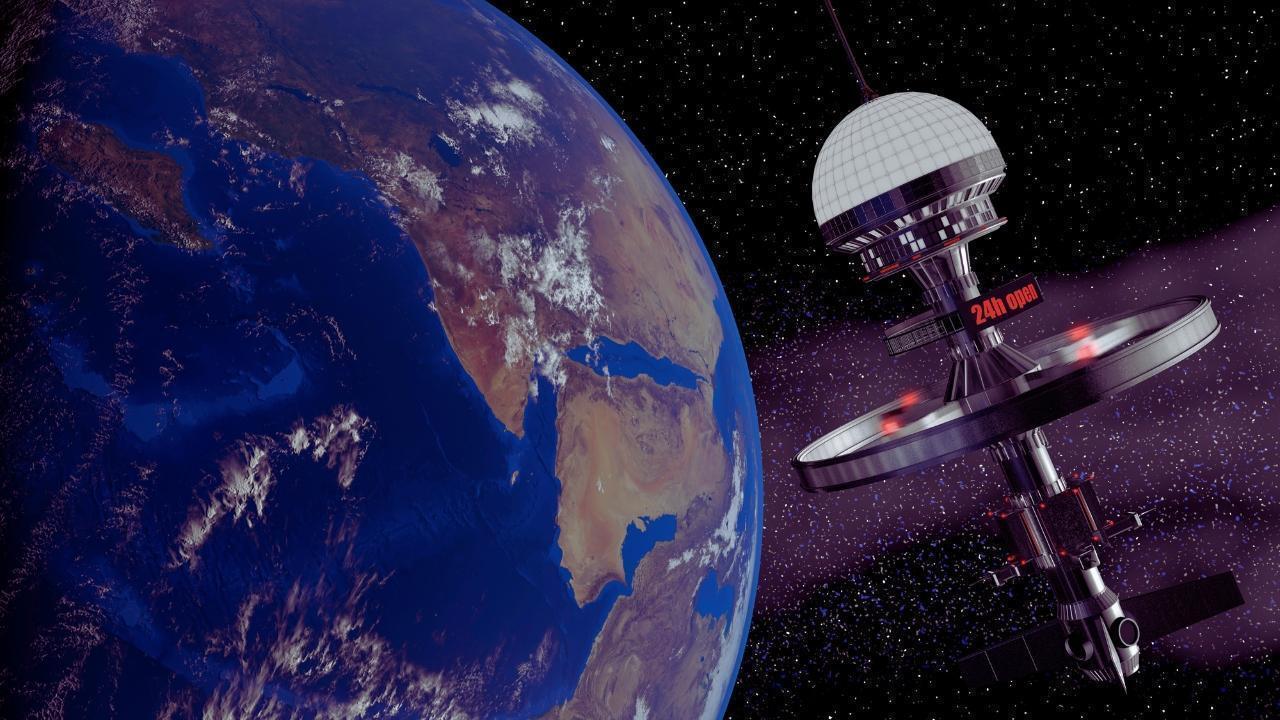You have not yet added any article to your bookmarks!

Join 10k+ people to get notified about new posts, news and tips.
Do not worry we don't spam!

Post by : Anis Farhan
Just a few years ago, the idea of booking a vacation to space felt like a distant fantasy, only suited for the ultra-rich or sci-fi dreamers. Today, however, space tourism is becoming a legitimate industry. While American companies like SpaceX, Blue Origin, and Virgin Galactic have dominated headlines, Asia is quickly emerging as a serious contender in the race to make outer space a travel destination. Countries like China, India, Japan, and even Southeast Asian nations are investing heavily in space exploration, public-private partnerships, and technological capabilities that could turn them into major players in the space tourism market.
The question now is no longer whether space tourism will happen — but whether Asia will become its most vital launchpad.
China has made its ambitions clear: it wants to be a global space leader by 2030. The country’s state-backed space agency, CNSA (China National Space Administration), has already launched crewed missions, built the Tiangong space station, and is planning lunar bases. But China isn’t just interested in science — it's eyeing the commercial viability of space too.
Private companies like iSpace, Galactic Energy, and ExPace are emerging rapidly. With government support, these startups aim to develop reusable launch vehicles, space planes, and affordable commercial space travel platforms. The Chinese government sees tourism as part of its long-term space economy strategy, especially as domestic demand grows for high-profile, aspirational travel experiences.
If China opens its space infrastructure to commercial players or tourists in the next decade, it could become the region’s — or the world’s — most accessible space tourism hub.
India’s space journey has always been one of doing more with less. Through ISRO (Indian Space Research Organisation), India has achieved incredible milestones on tight budgets — from its Mars Orbiter Mission to its successful lunar lander mission in 2023. Now, India’s focus is subtly shifting from purely scientific missions to commercial ambitions.
The country is opening its doors to private aerospace startups through initiatives like IN-SPACe, encouraging public-private partnerships. Startups like Skyroot Aerospace and Agnikul Cosmos are already working on small satellite launches and reusable launch vehicles. Space tourism is not yet India’s main goal — but the groundwork is being laid.
Given India’s deep pool of tech talent, relatively low operational costs, and growing entrepreneurial ecosystem, the country could offer space travel at more affordable rates than its Western counterparts in the future. That could make India the “budget airline” of space tourism — accessible to more than just billionaires.
Japan has a long history in space. Its agency JAXA (Japan Aerospace Exploration Agency) has been a global leader in robotics, asteroid missions, and international cooperation. But Japan is now also placing bets on commercial opportunities.
Startup Ispace plans to make lunar resource mining a reality, while companies like PD AeroSpace are working on suborbital tourism using space planes. Japan’s focus is on reliability and safety, key components for building trust in a nascent industry like space tourism.
With Tokyo’s tech-savvy population, high-income economy, and national pride in cutting-edge innovation, Japan could offer an elite space tourism experience—targeted at premium travelers who value high-quality, immersive experiences.
While countries like Malaysia, Thailand, and Indonesia may not yet be global space leaders, they are quietly building the ecosystem needed to support future space tourism.
In 2024, Malaysia unveiled its National Space Policy 2030, which focuses on building space tech capacity and forming international partnerships. Singapore, already a hub for aerospace R&D and satellite tech, has seen a boom in space startups thanks to strong government support and global investors.
Thailand has recently launched education-focused initiatives in space science and is collaborating with international agencies. These nations may not launch spacecraft immediately, but they could become regional launchpads, tech hubs, or even training centers for space tourism in the Asia-Pacific.
Private innovation is driving the space tourism boom worldwide, and Asia is no exception. Across the region, dozens of startups are popping up in cities like Bengaluru, Shanghai, Tokyo, and Singapore.
Skyroot Aerospace, Japan’s Interstellar Technologies, and China's Galactic Energy are pushing boundaries in launch tech. Meanwhile, companies in Singapore and Malaysia are building solutions in satellite communications, space law, and even space hospitality.
With costs of launch vehicles steadily decreasing and reusable rockets becoming more reliable, these startups are laying the foundation for a robust commercial space sector. As investment pours in, we’re likely to see Asian companies offering everything from zero-gravity flights to orbital stays in less than two decades.
Despite the optimism, there are substantial roadblocks ahead.
Regulatory barriers remain high in several Asian countries, with few clear frameworks on space tourism.
Funding gaps continue to plague space startups, especially in emerging markets like Southeast Asia.
Public skepticism and safety concerns still dominate public discourse.
Infrastructure limitations, such as lack of domestic launch sites or astronaut training centers, can slow progress.
Moreover, space tourism is still a luxury market. For Asia to truly lead, it must find ways to make space travel more inclusive, cost-effective, and sustainable.
A rising concern globally — and especially among environmentally conscious Asian youth — is the carbon footprint of space tourism. Each rocket launch currently releases tons of CO₂ and contributes to upper-atmosphere pollution. As Asian countries commit to sustainability goals under the Paris Agreement, balancing innovation with climate responsibility will be crucial.
Several Asian startups are already exploring green fuels, reusable rockets, and alternative propulsion systems to address this issue. If Asia leads on clean space tech, it could not only dominate the market but also set ethical standards for the future.
One of the biggest advantages Asia holds is geography. Equatorial locations such as Malaysia, Indonesia, and parts of India are ideal for launch efficiency. Several proposals have been floated for building spaceports in regions like:
Sriharikota (India)
Hainan (China)
Tanegashima (Japan)
Sabah (Malaysia)
Singapore is even exploring offshore launch platforms. These strategic locations could help Asian countries dominate launch operations for both tourism and satellite tech.
In Asia, the public appetite for space exploration is growing fast. Science centers, space camps, and STEM education have surged across urban and semi-urban areas. Millennials and Gen Z audiences in Asia are not just dreamers — they’re builders. This new generation is more willing to spend money on unique, purpose-driven experiences — like flying to the edge of Earth’s atmosphere or staying in a low-orbit space hotel.
Space travel is no longer a fantasy in Asia. It’s becoming a goal — and possibly a reality.
The signs are clear: Asia is no longer just a participant in the global space race — it is a frontrunner. With government backing, private innovation, a skilled workforce, and growing public interest, the region is poised to play a central role in space tourism over the next 10–20 years.
The challenge ahead is to unify ambition with action, and policy with purpose. If Asia can overcome regulatory hurdles and build the right infrastructure, it won’t just be launching rockets — it will be launching dreams.
The information in this article is based on publicly available data and does not represent investment advice or official government announcements. Space tourism is an emerging sector and subject to change based on regulatory, economic, and environmental developments. Readers are advised to follow updates from official sources and companies mentioned. The opinions expressed are those of the author and do not reflect the editorial stance of Newsible Asia.










Abhishek Sharma Hospitalised With Stomach Infection, Doubtful for India’s T20 World Cup Match Against Namibia
Indian opening batter Abhishek Sharma has been hospitalised with a stomach infection and is unlikely

Mass Shooting in British Columbia Leaves 10 Dead in One of Canada’s Deadliest Attacks
A tragic mass shooting at a high school and nearby residence in Tumbler Ridge, British Columbia, has

More Than a Ticket Out: How IPOs Are Redefining Value for Startups and Investors
In the evolving startup ecosystem, initial public offerings (IPOs) have emerged as far more than exi

Study Warns Using AI for Medical Advice Is ‘Dangerous’ as Users Get Inaccurate Health Guidance
A major new study reveals that artificial intelligence (AI) chatbots and tools may give misleading o

Top Sci-Fi Movies Streaming on Netflix This February: Must-Watch Picks for Genre Fans
A curated news-style guide to the best science fiction films currently available on Netflix in Febru

BCCI Central Contracts Shake-Up: Kohli, Rohit Moved to Grade B as Board Reshapes 2025–26 List
Virat Kohli and Rohit Sharma have been placed in Grade B in the BCCI’s 2025–26 central contract list